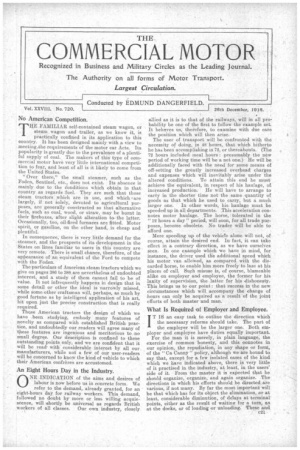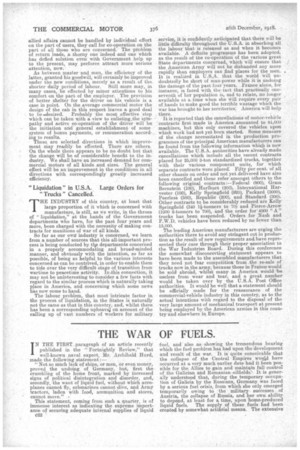No American Competition.
Page 1

Page 2

If you've noticed an error in this article please click here to report it so we can fix it.
THE FAMILIAR self-contained steam wagon, or steam wagon and trailer, as we know it, is practically confined in its application to this country. It has been designed mainly with a view to meeting-the requirements of the motor car Acts. Its popularity is greatly due to the prevalence of a plentiful supply of coal. The makers of this type of commercial motor have very little international competition to fear, and least of all is it likely to come from the United States.
"Over there," the small steamer, such as the Foden, Sentinel, etc., does not exist. Its absence is mainly due to the donditions which obtain in that country as regards fuel. They are such that those steam tractors which are in use, and which care largely, if not Solely, devoted to agricultural purposes, are generally constructed so that alternative fuels, such as coal, wood, or straw, may be burnt in their fireboxes, after slight alteration to, the latter. Occasionally, too, oil-fired furnaces are fitted. Motor spirit, or gasoline, on the other hand, is cheap and plentiful.
In consequence, there is very little demand for the steamer, and the prospects of its development in the States on lines familiar to users in this country are very remote. There is small chance, therefore, of the apPearance of an equivalent of the Ford to compete with the Foden.
The particulars of American steam tractors which we give on pages 386 to 388, are nevertheless of undoubted interest, and a study of them cannot fail to be of value. It not infrequently happens in design that in some detail or other the ideal is narrowly missed, while some other craftsman will, perhaps, as much by good fortune as by intelligent application of his art, hit upon just the precise construction that is really required. These American tractors the design of which we have been studying, embody many features of novelty as compared with established British practice, and undoubtedly our readers will agree many of these features are ingenious and meritorious to no small degree. Our description is confined to these outstanding points only, and we are confident that it will be read. with considerable interest by all our manufacturers, while not a few of Our user-readers will be concerned to know the kind of vehicle to which their American confreres are accustomed.
An Eight Hours Day in the Industry.
ONE INDICATION of the aims and desires of labour is now before us in concrete form. We • refer to the demand, already granted, for an eight-hours day for railway workers. This demand, followed no doubt by. more or less willing acquiescence, will shortly be universal as regards British workers of all classes. Our own industry, closely. , 26th December, 1918.
. . • allied as it is to that of the railways, will in all probability be one of the first to follow the example set. It behoves us, therefore, to examine with due care the position which will then arise. The user of transport will be confronted with the necessity cq doing, in 48 hours,, that which hitherto he has been accomplishing in 72, or thereabouts. (The 72 hours included meal hours : presumably the new period of working time will be a net one.) He will be additionally faced with the need for some means of off-setting the greatly increased overhead charges and expenses which will inevitably arise under the altered conditions. To attain this end he must achieve the equivalent, in respect of his haulage, of increased production. He will have to arrange to carry in the shorter time not the same quantity of goods as that which he used to carry, but a much larger one. In other words, his haulage must be speeded up in all departments. This acceleration connotes motor haulage. The horse, ' tolerated in the "12 hours a day" period, will soon, for all trade purposes, become obsolete. No trader will be able to afford one.
Mere speeding up of the vehicle alone will not, of course, attain the desired end. In fact, it can take effect in a contrary direction, as we have ourselves seen. In one example which -we have in mind, for instance,, the driver used the additional speed which his motor van alloWed, as compared with the discarded horse, to enable him more freely to laze at his places ofcall. Suph misuse is, of course, blameable alike on employer and employee, the former for his laxity of supervision, the latter for his dishonesty. This brings us to our point: that success in the new circumstances which will accompany the change of hours can only be acquired as a result of the joint efforts of both master and man.
What Is Required of Employer and Employee.
IT IS an easy task to outline the direction which the necessary reforms should take. The part of the employer will be the larger one. Both employer and employee have duties equally important. For the man it is merely, in plain language, the exercise of common honesty, and this connotes in our opinion, the repudiation, in any shape or form, of the "Ca Canny" policy, although we are bound to say that, except for a few isolated cases of the kind which we have indicated above, there is very little of it practised in the industry, at least, in the users' side of it. From the master it is expected that he should organize, organize, and again organize. The directions in which his efforts should be directed are various, if not many. By far the most important will be that which has for its object the elimination, or at least, considerable diminution, of delays at terminal points, either as the result of waiting for a turn, as at the docks, or of loading or unloading. These and allied affairs cannot be handled by individual effort on the part of users they call for co-operation on the part, of all those who are concerned. The problem of return loads a thorny one indeed and one which has defied solution even with Government help. up to the present, may perforce attract more serious attention, now.'
As between master and man, the efficiency of the latter, granted his goodwill, will certainly be improved under the new conditions, merely as a result of the shorter daily period of labour. Still more may, in many cases, be effected by minor attentions to his comfort on the part of the employer. The provision of better shelter for the driver on his vehicle is a case in point. On the average commercial motor the design of the cab in this respect leaves a good deal
to be 'desired. Probably the most effective step which can be taken with a view to enlisting,the sympathy and active co-operation of the driver will be the initiation andgeneral establishment of some system of bonus payments, or remuneration according to results. • These, are selected directions in which improvement may readily be effected. There are others. On the whole there appears to be no doubt but that the change will be of considerable benefit to the industry. We shall have an increased deins,nd for Commercial motors of all kinds and sizes. The general effect will be an improvement in the conditions in all directions with correspondingly greatly increased efficiency.
"Liquidation" in U.S.A. Large Orders for " Trucks " Cancelled.
THE INDUSTRY of this country, at least that large proportion of it which is concerned with manufacture, is still, as we write, in the throes of "liquidation," at the hands of the Government departments who have, for the past four years and more, been charged with the necessity of making contracts for munitions of war of all kinds.
So far as our own industry is concerned, we learn from a number of sources that this all-important process is being conducted by th,,e departments concerned in a properly accommodating and broachnainded manner, and obviously with the intention, so far as possible, of being as helpful to the various interests concerned as can be contrived, in order to enable them to tide over the very difficult stage of transition from wartime to peacetime activity. In-this connection, it may not be uninteresting to consider a few fa,ets with regard to the similar process Which is naturally taking place in America, and concerning which some news has now come to hand.
The labour problem, that most intricate factor in the process of liquidation, in the States is naturally not the same as that in this country, and, whilst there has been a corresponding upheaval on account of the calling up of vast numbers of workers for military
service.; it is confidently anticipated that. there will be little difficulty throughout the U.S.A. in absorbing all the labour that, is released as and when it becomes available. A definite programme has been adopted, as the result of the co-operation of the various great State departments concerned, which will ensure that the American Army will not be disbanded any more rapidly than employers can find places for the men. It is realized in U.S.A. that the world will undoubtedly be short of man-power while it is undoing the damage of the past four years. France alone, for instance, is faced with the tact that practically oneseventh of her population is, sad te relate, no longer available at a..tmae when she Will require every pair of hands to make good the terrible wastage which the war has brought to. her territories. America will help there.
It is reported that the cancellations of motor-vehicle contracts first made in America amounted to 81,000 machines, but this only covered the vehicles upon which work had not yet been started. Some measure of the change necessitated in the production programmes of the principal American manufacturers can be found from the following information winch is now available. The U.S.A. authorities have already made cancellations which include all the recent contracts placed for 25,000 3-ton standardized trucks, together with their various component units, for which • separate contracts were placed: Fifty per cent. of all other chassis on order and not yet delivered have also been cancelled and these refer amongst others to the following original contracts :—Federal (800), Grain Bernstein (100); Hurlburt (200), International Harvester (100), Kelly Springfield (920), Packard (3000), Peerless (600), Republic (200), and Standard (300). Other contracts to be considerably reduced are Kelly Springfield (340 li-tonners to 70) and Pierce-Arrow (1000 2-tonners to 700), and the order for' 4000 " A " trucks has been suspended. Orders for Nash and F.W.D. vehicles have been reduced by no fewer than 15,000. The leading American manufacturers are urging the authorities there to avoid any stringent cut in production as the result of new requirements and have represented their case through their proper association to the War Industries Board. During this conference the somewhat disconcerting statement appears ,to have been made to the assembled manufacturers that they need not fear competition from the re-sale of trucks now in the army, because those in France would be sold abroad, whilst many in America. would be useless from wear and tear, and a great number would be taken over by the U.S.A. Post Office authorities. It would be well that a statement should be officially made for the reassurance of the commercial-vehicle industry in this country, as to the actual intentions with regard to the disposal of thevery large amount of mechanical transport at present being employed by the American armies in this country and elsewhere in Europe.






















